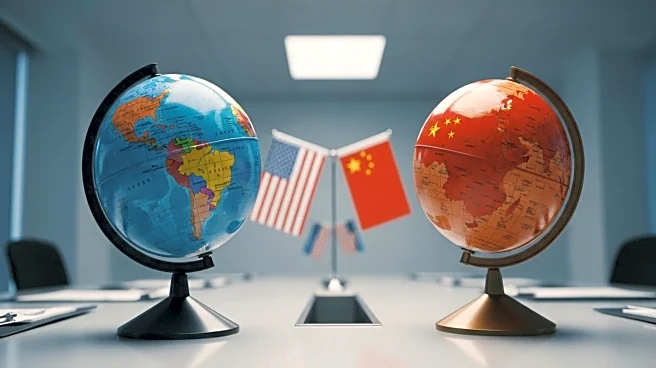What is the story about?
What's Happening?
President Trump and Chinese President Xi Jinping have agreed to meet at the Asia-Pacific Economic Cooperation (APEC) summit in South Korea next month, amidst ongoing trade tensions between the U.S. and China. The discussions have been overshadowed by the fate of TikTok in the U.S., with uncertainty surrounding the app's divestiture from its Beijing-based parent company, ByteDance. While the U.S. has been vocal about its demands, China has remained silent on future meetings and has provided vague commitments regarding a tech licensing deal to keep TikTok operational in the U.S. This lack of clarity has led to speculation about the potential for a comprehensive U.S.-China trade deal, which now seems increasingly elusive.
Why It's Important?
The ongoing negotiations between the U.S. and China are crucial for both countries' economies, particularly in the technology sector. TikTok's future in the U.S. is a significant point of contention, as it represents a broader struggle over technological dominance and data security. The U.S. is keen on ensuring that TikTok's operations comply with American laws, while China is cautious about losing control over one of its major tech assets. The outcome of these discussions could impact bilateral trade relations, influence global tech policies, and affect the operations of multinational companies involved in the tech industry.
What's Next?
As the APEC summit approaches, both countries are expected to continue negotiations, with potential implications for the tech industry and international trade. The U.S. administration remains confident in reaching a deal that would require ByteDance to spin off TikTok's U.S. operations. However, China's strategic silence and media campaigns suggest a complex negotiation process ahead. The upcoming meetings could either pave the way for a resolution or further complicate the trade relationship between the two nations.
Beyond the Headlines
The TikTok negotiations are part of a larger geopolitical context, where both countries are vying for technological supremacy. China's recent actions, including probes into U.S. chip companies and showcasing its own semiconductor capabilities, highlight its ambition to assert itself as a tech power. The timing of these events, coinciding with China's national cybersecurity week, underscores the strategic nature of China's approach to international negotiations.














